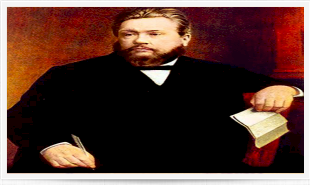|
|

about
The most widely-known preacher of the age, was born at Kelvedon, County of Essex, England, June 19, 1834. At an early age he was removed to his grandfather s house at Starnbourne, in the same SPURGEON 109:: SrUR GEON county, and remained there several years. His grandfather, who was the pastor of the Independent church of that place, and a man of considerable note for his long-continued and useful labors, was soon impressed with the child s though tfulness and keen moral perceptions. Most of the pious people who were ... more »

sermons
I do not come into this pulpit hoping that perhaps somebody will of his own free will return to Christ. My hope lies in another quarter. I hope that my Master will lay hold of some of them and say, "You are mine, and you shall be mine. I claim you for myself." My hope arises from the freeness of grace, and not from the freedom of the will.

library
Spurgeon's study at Westwood, his family home, contained more than 12,000 volumes. The majority of these were acquired by a donor who gave them to Curry Library at William Jewell College (near Kansas City). Books, furniture, and all were moved there, where they resided in a room that was a replica of Spurgeon's personal study until 2006.
![]() The Complete Works of Charles Spurgeon
The Complete Works of Charles Spurgeon
![]() Puritan Works in the Spurgeon Collection
Puritan Works in the Spurgeon Collection
![]() Additional Library Images
Additional Library Images
![]() Images from Westwood
(some very rare)
Images from Westwood
(some very rare)
(ca.1860) —Charles H. Spurgeon